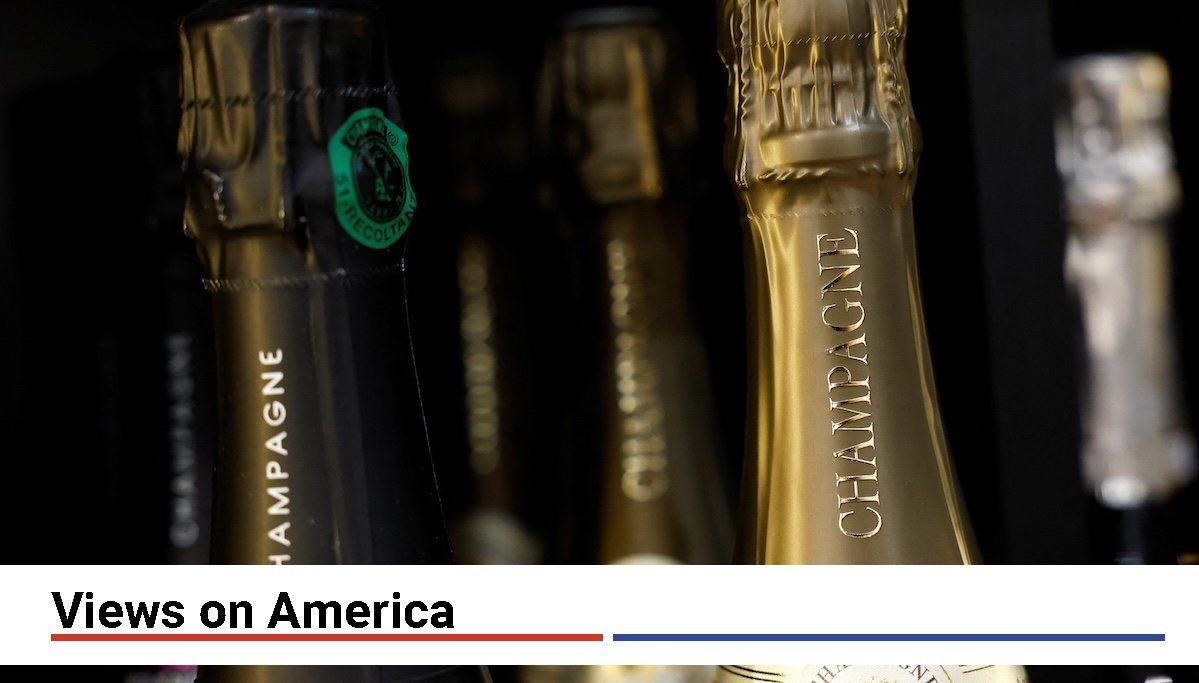The party ended abruptly last week, and the last bottle of European champagne may have popped.
After President Donald Trump imposed 25% tariffs on all steel and aluminum imports, US allies quickly announced countermeasures. This included a European Union plan to introduce 50% tariffs on US whiskey. Further accelerating any impending trade war, Trump responded by threatening a 200% tariff on all EU wines, champagnes, and alcoholic products. In the words of former President Thomas Jefferson as interpreted by Lin-Manuel Miranda in “Hamilton,” “Look, when Britain taxed our tea, we got frisky. Imagine what gon’ happen when you try to tax our whiskey.”
European leaders caught between the rock of needing Trump to help bring an end to the war in Ukraine (while they aim to beef up collective defense) and the hard place of fearing economic contraction from US tariffs are quickly realizing that nobody is having fun anymore.
Lessons of a tariff man
As Europe and others look to rebound from the latest round of the Trump administration’s trade offensive, a few misguided lessons are being drawn. The first is about Trump’s attachment to tariffs and protectionist trade policy. Many headlines in recent weeks have propelled a narrative of the Trump “whipsaw” or the view that the administration quickly U-turns on trade policy. Examples like the retreat on Colombia or the initial deferral for Canada and Mexico are frequently cited as evidence of the tendency toward reversals. What these perspectives underappreciate, however, is both how longstanding Trump’s regard for tariffs has been, and how fundamental the administration sees it to its broader policy objectives. The concession-reprieve cycle is the noise, while economic security as national security is the signal.
Trump’s zest for tariffs dates back to the 1980s and was widely written about during his first administration. Now, this four-decade history seems to have been overtaken by disorientation and incredulity. In an interview given in 1989, Trump reportedly said “America is being ripped off … We’re a debtor nation, and we have to tax, we have to tariff, we have to protect this country.” Taking to social media last week, Trump echoed these sentiments, posting, “The US doesn’t have Free Trade. We have ‘Stupid Trade.’ The Entire World is RIPPING US OFF!!.” In short, there is no new Donald Trump.
But it is not just that Trump may be ideological about tariffs; it is also that he and his team have placed these beliefs at the center of their second-term ambitions. In a Day 1 presidential action, the administration announced that “Americans benefit from and deserve an America First trade policy.” For the Trump administration, “America First trade” means promoting investment and productivity, enhancing US industrial and technological advantages, and defending economic and national security to benefit American workers. Each of these objectives will be backed up by efforts to address unfair and unbalanced trade – tariffs and other measures – and wider economic security considerations, including reviews and investigations, with special attention given to economic and trade relations with the People’s Republic of China. The administration has laid it all out by executive action. When Trump orders the creation of an External Revenue Service to collect tariffs, duties, and other foreign trade-related revenues, he plans to collect the money.
Missed connections
The other lesson that should be gleaned from what has unfolded in recent weeks between the US and its allies, particularly in Europe, is about a mismatch in intentions. Trump and his trade team believe that protectionist policies will restructure the global trade system in favor of US industrial and manufacturing strength. Imposing tariffs across the board on steel and aluminum is aimed at reigniting the US metals industry, whether this comes to fruition will take years to assess.
When Europe responds to industrial tariffs by targeting goods with only limited substitutability like US whiskey, the goal is to find a pain point and apply leverage. The downside of such an approach, however, is exactly what analysts, the financial market, and those targeted by US tariffs have lobbed at Trump: It will be domestic consumers that are most hurt. Will Europeans turn to the United Kingdom to replace American whiskey with Scotch? Perhaps. But the UK is no longer in the EU anyway. France, Germany, and others seem unlikely to invest in their own domestic distilling for near-term gain. Instead, Europeans will be left to pay a heftier price for whiskey or go without. Likewise, Trump’s proposed countermeasures on European champagne put US consumers in an analogous position. The US domestic wine market may be robust, but champagne can only be made in Champagne, France.
As the potential domestic impact ratchets up, US allies will likely discover that retaliation leaves a bitter aftertaste, especially for the Transatlantic relationship. This is the forcing function of tariffs that the Trump administration is hoping to see.
US presidents who came before Trump like William McKinley and Herbert Hoover found that the best tariff intentions do not always turn out as planned, instead bringing domestic price increases and economic downturns. In the current interconnected world where supply chains are truly global, the historical experience may not directly apply. Still, there is a real risk that it might. The question is, when the music stops, who is left with a seat and a glass of bubbly?
Lindsay Newman is a geopolitical risk expert and columnist for GZERO.
